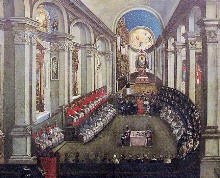
The Canons And Decrees Of The Council Of Trent
TOUCHING THE SACRAMENTS IN GENERAL
CANON I. If any one shall say, that the sacraments of the New Law were not all instituted by Jesus Christ, our Lord; or, that they are more, or less than seven, to wit, Baptism, Confirmation, the Eucharist, Penance, Extreme Unction, Orders, and Matrimony; or even that any one of these seven is not truly and properly a sacrament; let him be anathema.
CANON II. If any one shall say, that these said sacraments of the New Law do not differ from the sacraments of the Old Law, save that the ceremonies are different, and the outward rites different; let him be anathema.
CANON III. If any one shall say, that these seven sacraments are equal to each other in such wise, as that one is not in any way more worthy than another; let him be anathema.
CANON IV. If any one shall say, that the sacraments of the New Law are not necessary unto salvation, but superfluous, and that without them, and without the desire thereof, men, through faith alone, obtain of God the grace of justification; though all [the sacraments] be not necessary for every individual; let him be anathema.
CANON V. If any one shall say, that these sacraments were instituted for the sake of nourishing faith alone; let him be anathema.
CANON VI. If any one shall say, that the sacraments of the New Law do not contain the grace which they signify; or, that they do not confer that grace on those who do not place an obstacle in the way; as though they were merely outward signs of grace or righteousness received through faith, and certain marks of the Christian profession, by which the believers are distinguished amongst men from the unbelievers; let him be anathema.
CANON VII. If any one shall say, that grace, as far as concerneth God’s part, is not given through the said sacraments, always, and to all men, even though they rightly receive them, but [only] sometimes, and to some persons; let him be anathema.
CANON VIII. If any one shall say, that by the said sacraments of the New Law grace is not conferred through the act performed, but that faith alone in the divine promise suffices for obtaining grace; let him be anathema.
CANON IX. If any one shall say, that, in the three sacraments, Baptism, to wit, Confirmation, and Orders, there is not imprinted on the soul a character, that is, a certain spiritual and indelible sign, on account of which they cannot be repeated; let him be anathema.
CANON X. If any one shall say, that all Christians have power to administer the word, and all the sacraments; let him be anathema.
CANON XI. If any one shall say, that, in ministers, whilst they effect, and confer the sacraments, there is not required the intention at least of doing what the Church does; let him be anathema.
CANON XII. If any one shall say, that a minister, being in deadly sin, provided that he observe all the essentials which belong to the performance or conferring of the sacrament, neither performs nor confers the sacrament; let him be anathema.
CANON XIII. If any one shall say, that the received and approved rites of the Catholic Church, wont to be used in the solemn administration of the sacraments, may be contemned, or without sin omitted at pleasure by the ministers, or be changed by any pastor of the churches into other new ones; let him be anathema.
Copyright ©1999-2023 Wildfire Fellowship, Inc all rights reserved

 Keep Site Running
Keep Site Running